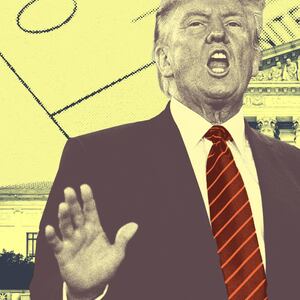The Supreme Court signaled it will issue rulings on Monday, an unusual declaration that indicates it may have made a decision on the high-stakes question of whether Colorado may legally bar Donald Trump from appearing on the state’s primary ballot.
On its website, the Supreme Court said it will release an order list on Monday, Mar. 4—the day before Colorado’s state primary is set to take place alongside several other states, a primary season event known as Super Tuesday.
The high court said in a statement on its website that it “may release opinions beginning at 10 a.m.” Monday, but won’t take the bench.
The court typically issues its rulings from the bench, and the unusual note could reflect the expedited timeline on which it heard Trump’s immunity case and the decision’s extremely sensitive timetable.
The justices are not scheduled to take the bench again until Mar. 15.
Trump is currently set to appear on the Colorado ballot despite a ruling made by the state Supreme Court, which declared that Trump is ineligible to run in the race because his role in the Jan. 6, 2021 Capitol riots amounted to “insurrection.”
The state ruling has been on hold while Trump appealed it.
The Supreme Court heard oral arguments in early February in the case, which hinges on the assertion that Trump is barred from running for office under Section 3 of the 14th Amendment, otherwise known as the “insurrection clause.” That provision was originally added to prevent ex-Confederates from holding U.S. office after the Civil War on the grounds that they had broken their oaths to the Constitution and acted against it.
Trump’s lawyers have denied that he participated in any insurrection and have argued that the president doesn’t constitute “an officer of the United States” as written in the text. That defense didn’t sway a panel of D.C. judges in a separate immunity case, which the Supreme Court has also agreed to hear.
A ruling, if it lands on Monday, could determine Trump’s eligibility to appear not only in the Colorado race, but in a number of states that have attempted to bar him from their primary and general election ballots—including Illinois and Maine.







